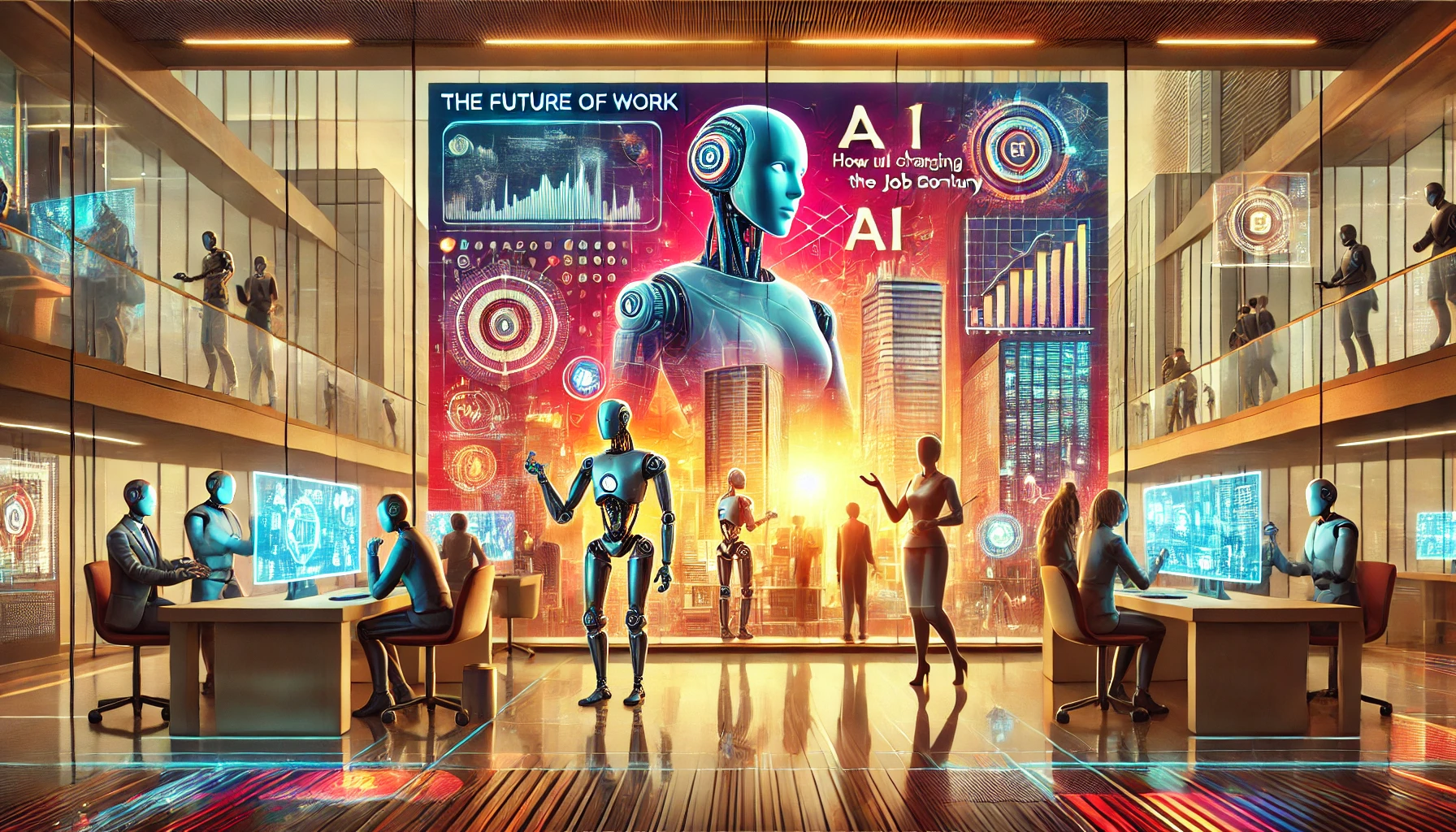
The Future of Work-How AI is Changing the Job Market in 21st Century
The rapid evolution of artificial intelligence (AI) is transforming industries and redefining how we work. In 21st century, AI is not only automating repetitive tasks but also creating new opportunities for skilled workers. This post explores how AI is reshaping the job market, which industries are most affected, and what you can do to stay ahead.
How AI is Transforming the Workplace
AI impacts the workplace in several significant ways:
- Automation of Repetitive Tasks: Tasks like data entry, scheduling, and basic customer support are increasingly handled by AI tools, allowing employees to focus on strategic work.
- Enhanced Decision-Making: AI provides data-driven insights, helping businesses make faster and more informed decisions.
- Creation of New Roles: Emerging fields like AI ethics, machine learning operations (MLOps), and AI-driven design are creating demand for specialized skills.
- Remote Work Optimization: AI tools are streamlining virtual collaboration, from automated transcription to project management.
How AI is Transforming Industries
AI is impacting almost every industry. Here’s how:
| Industry | AI’s Impact |
|---|---|
| Healthcare | AI diagnoses diseases, powers surgical robots, and predicts patient outcomes. |
| Finance | Automates fraud detection, risk assessment, and trading. |
| Education | AI-driven tools personalize learning experiences and automate grading. |
| Retail | Enhances inventory management, customer service, and targeted marketing. |
| Manufacturing | AI-powered robots handle repetitive tasks, improving efficiency. |
| Transportation | Self-driving vehicles and AI-based logistics optimize operations. |
Jobs at Risk Due to AI
AI is automating repetitive and predictable tasks, making some job roles less relevant. Jobs at risk include:
- Data Entry Clerks: Automated software can input and process data faster.
- Cashiers: AI-powered checkout systems reduce the need for human cashiers.
- Telemarketers: AI chatbots and automated calling systems are replacing these roles.
- Manufacturing Line Workers: Robots and AI systems handle assembly tasks efficiently.
Emerging Career Opportunities in AI
As AI takes over routine tasks, new opportunities are emerging in fields that require creativity, problem-solving, and technical expertise. Some high-demand roles in 2024 include:
| Job Role | Description | Skills Required |
|---|---|---|
| AI Specialist | Designs and implements AI models. | Machine learning, Python, data science. |
| Data Scientist | Analyzes large datasets to derive insights. | Statistics, programming, visualization. |
| Cybersecurity Analyst | Protects systems against AI-driven threats. | Network security, ethical hacking. |
| AI Trainer | Teaches AI systems how to respond correctly. | Natural language processing, training AI. |
| Human-AI Interaction Designer | Develops user-friendly AI interfaces. | UX design, AI integration skills. |
| Robotics Engineer | Designs and builds intelligent robots. | Mechanical engineering, AI programming. |
Skills in Demand for the AI-Driven Future
To stay relevant, workers must acquire skills that complement AI rather than compete with it. These include:
Technical Skills:
- Machine learning, data analysis, and Python programming.
- Certifications in AI platforms like TensorFlow or AWS.
Soft Skills:
- Creativity: Essential for problem-solving and innovation.
- Emotional intelligence: AI lacks empathy, making this skill valuable.
- Adaptability: Embracing new tools and technologies is key to staying competitive.
Interdisciplinary Knowledge:
- Combine technical expertise with domain-specific knowledge (e.g., AI in healthcare or finance).
How to Prepare for the AI Future
Upskill Yourself:
- Take courses in AI, data science, or machine learning through platforms like Coursera or edX.
- Learn programming languages like Python, R, or JavaScript.
Leverage AI Tools:
- Familiarize yourself with AI-powered tools like ChatGPT, Canva AI, or Notion AI to enhance your productivity.
Focus on Human-Centric Roles:
- Explore roles that require critical thinking, creativity, or interpersonal skills.
Stay Updated:
- Follow industry trends, blogs, and news about AI developments.
AI’s Dual Impact: Opportunity vs. Threat
| Opportunities | Threats |
|---|---|
| New high-paying roles in AI and data fields. | Automation of routine and repetitive jobs. |
| Enhanced productivity and business growth. | Job displacement in traditional industries. |
| Improved decision-making using AI insights. | Growing skills gap for untrained workers. |
Conclusion
AI is not just a disruptor; it’s an enabler of progress. While some jobs may disappear, many more will evolve or be created. The key to thriving in the AI-driven job market of 2024 is to stay adaptable, continually upskill, and embrace the opportunities AI brings.
Start preparing today to secure your place in the future workforce!
Would you like a deeper dive into specific industries or roles? Let me know!
About The Author
Hello! I’m Parneet Tanwar, a passionate blogger with a love for sharing insights, ideas, and stories. Whether I’m exploring new trends, diving into personal growth topics, or simply sharing what’s on my mind, my goal is to inspire and connect with my readers. I believe in the power of words to make a difference, and I’m always excited to learn and grow alongside my audience. Welcome to my blog—thank you for being here!

[…] 3. The Future of Work: How AI Is Changing the Job Market […]